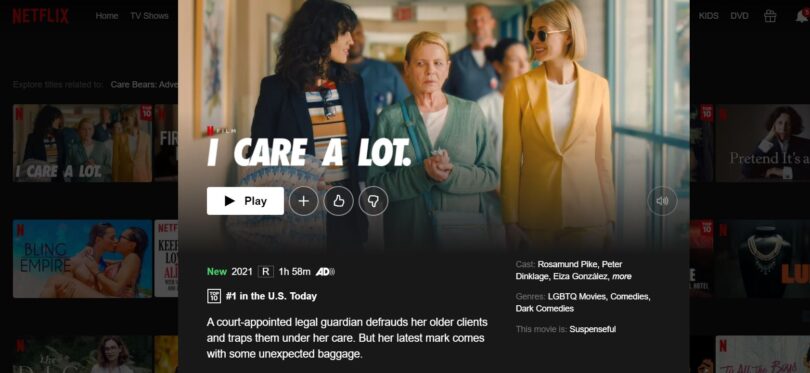With the COVID-19 pandemic still ongoing, Bluffton students may be having trouble figuring out what to do with their free time without breaking social distancing. One good, safe activity is watching movies. Bluffton students may be interested in the film “I Care a Lot,” directed by J Blakeson, which began streaming on Netflix on Feb. 19.
The film stars Rosamund Pike as Marla Grayson, a con woman who convinces courts to appoint her as a guardian to the elderly. She uses her status to siphon money from her wards after placing them in assisted living facilities by selling their cars, homes, and other assets. Grayson is informed of a woman named Jennifer Peterson (Dianne Wiest), who lives alone in a nice neighborhood and has ludicrous savings accounts. Grayson gains guardianship over Peterson, who she sees as just another mark, but this draws the ire of her son (Peter Dinklage), a vicious career criminal making Grayson and her lover Fran (Eiza González) targets for his vengeful wrath.
The film is a grounded, dark experience that earns its R rating with instances of vulgar language and violence, though neither seems particularly gratuitous. For language, the most extreme example is when a character confronts Grayson outside of court and says that he hopes she gets raped, while violence is mostly limited to blunt force trauma and a single gunshot with a pool of blood. If what is written here doesn’t seem too upsetting to readers, then they should have no issue watching the film, though it will likely still be a tense experience.
Primary praises for the film go to the performances of Pike and Dinklage. Pike, who had made her film debut as the Bond girl in 2002’s “Die Another Day,“ instead takes a more serious direction as the selfish, cruel, and greedy Marla Grayson, a role not unlike her role as Amy Elliot Dunne in 2014’s “Gone Girl.” Manipulative and only caring about money, she frequently attempts to invoke feminism to dismiss criticism for her behavior, acting as if the threats she receives for her schemes are only because men are frightened of a powerful woman, and not the fact she effectively kidnaps the elderly for money, proudly displaying walls of the wards she’s dumped into a complicit elder care home. Her arrogance gets her and her associates into trouble, and she’s too proud to simply walk away when things get too dangerous. She’s thoroughly unlikable beyond her relationship with Fran, but as Fran is her business partner as well, it hardly helps her case. That said, Pike’s performance leads me to believe this unlikability was a deliberate teardown of the “girlboss” mentality as opposed to a character we are supposed to celebrate that simply missed the mark.
Dinklage nails his performance as the son of Peterson, who will not be named as his name is deliberately withheld in the film for an extended period of time. Despite being the shortest person in any scene he’s in, his subordinates cower before him and he acts as threatening as required to make their responses believable. Silent and stoic with bouts of throwing things or pointing guns when he gets particularly upset, he clearly is willing to hurt others to get what he wants. Of course, Dinklage had long proven himself capable of portraying a cruel, violent, and selfish leader with his role as Tryion Lannister in “Game of Thrones,”, but seeing him in a modern setting in a business suit, I was never reminded of his role of Miles Finch, or “the angry elf” from 2003’s “Elf” despite that being the role I grew up remembering him as.
My major complaints are the length and some writing issues. Clocking in at one hour and fifty-eight minutes, I feel the movie could’ve been about twenty minutes shorter, though I can’t think of any individual scenes to remove entirely beyond a few scenes of Grayson exercising in a gym with neon lighting. Perhaps these scenes have a symbolic element I missed.
In terms of writing, Grayson and Dinklage’s characters seemed uneven. As previously mentioned, Grayson is mostly unlikable, which isn’t inherently a bad thing, but Dinklage’s character stood out as more sympathetic to me. While it may be my familiarity with him as an actor, his motivation of rescuing his mother is much easier to empathize with as she is unquestionably a victim in this scenario, whereas Grayson’s protection of Fran comes off as weaker as Fran was an active participant in Grayson’s crimes, and in fact is mostly just there to be “protagonist’s wife.” Removing the romantic element wouldn’t have really changed anything about the narrative beyond needing to explain why Fran is at Grayson’s house in certain scenes. One scene does suggest Dinklage’s character is overseeing a human trafficking operation, but since Grayson also effectively is, all it seems to do is set up a “not so different” approach between the two characters in order to achieve the film’s ending.
Overall, I enjoyed the film. Despite having an antagonist that was more compelling than the protagonist and a few one note characters, the film was an interesting experience and I felt my time was not wasted with it. Just remember that the film earns its R rating. With a plot that critiques how the elderly and. disabled are often seen as burdens to be taken care of instead of being people, as well as how identity politics can be weaponized and abused and how the wealthy exploit the poor, viewers may also find it relevant to current events.
“I Care a Lot” is currently streaming on Netflix.







